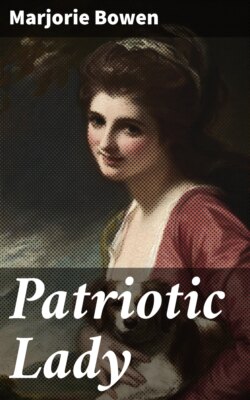Читать книгу Patriotic Lady - Bowen Marjorie - Страница 18
На сайте Литреса книга снята с продажи.
* * * * *
ОглавлениеTable of Contents
While Emma, who continued to behave herself to her master's liking, to study music and water-colour drawing, to keep her accounts, and to lead a very modest life in Edgeware Row, Romney painted her in at least thirty completed canvases. To these he gave haphazard titles; classicism was the fashion, and Emma's features were superbly classic, so Romney, with a little smattering of knowledge, named the poses Cassandra, Bacchante, Diana, Euphrosyne, Alope or Ariadne. She was Sensibility; she was painted as the Spinstress and The Seamstress, and knew how to imitate the modesty she had never known and the industry she detested. She was painted as a Wood-nymph, as Saint Cecilia, as The Comic Muse, as Nature, with a dog, with a goat, with a gazelle, in the Welsh hat of her mother's country-women, and simply as Emma. This last is the just title of all her portraits; the fancy labels make little difference, it was always Emma, in one of her poses, whom Romney painted.
Much was made of Emma's marvellous change of expression, which her admirers so extolled, but neither Romney nor any other painter ever put on canvas Emma's features distorted or transfigured by real emotion; portrait after portrait shows the same smooth regular face undisturbed by any feeling, the eyes sometimes open wide, sometimes cast down, the lips sometimes parted, sometimes closed, now a look of gravity, now a smile, but never anything but the most superficial change on the flawless unlined countenance, which never showed either the dreadful grandeur of a Cassandra, or the lofty exaltation of a Joan of Arc, but a certain mildness, shallow loveliness that might pass for virginal candour.
Romney's technique was devoid of tricks; he made no dangerous experiments, as did Sir Joshua, his downright style was suited to the obvious beauty of his model, with clear steady sweeps of his facile brush, with an expert curve of a limited palette, he placed on his canvas the madders and umbers, the crimson lakes and siennas of his home-ground paints and reproduced with them the firm, rosy flesh tints, the lustrous blue-brown eyes, the auburn locks of Emma.
This method suited his talent, his highly finished work was inclined to be hard, lacking in atmosphere and rather like a painting on porcelain; but in these rapid studies there was breadth and freedom, and they satisfy the eye even when they are unfinished.
In common with the portraitists of his day Romney painted his sitters in a steady studio light that cast only a pale shadow on the face and with imaginary backgrounds, like drop-cloths, that had no relation to the subjects of the picture, but which were hastily roughed in to throw up the figures to advantage. In his ardent studies of Emma, Romney kept to the Titian-like colourings of which he was fond, solid, rich, a golden cream, a rosy white in the carnation, fresh crimson lips, and hair varying according to the scheme of the picture, but always warm in tone, even too hot in the shadows.
Sometimes the Emma pictures were clumsy in finish, the face appearing like a mask, the arms and hands boneless, the figure without structure, the drapery wooden, but this body of work represented a definite achievement in art, which must be credited to both painter and model.
Possibly the most beautiful of all these portraits of Emma is the Ariadne, an exquisite, tender painting where the simple, downcast girl in her plain English attire is as delicate as a rose-petal blown on the canvas. Romney admired what he considered a natural beauty; he disliked the great ladies of Francois Boucher, product of the dressmaker and the dancing master, the grisettes and villagers of Greuze, product of the theatre and the circulating-library novel, and he painted his Emma without frippery or adornment.
Her loveliness was indeed natural, that of the moorland, not the Court, the dairy, not the drawing-room, and even those who found it lacking in breeding, subtlety or refinement had to admit that it owed nothing to the cosmetic box, the hairdresser, the jeweller, or the costumier; Emma's beauty shone most triumphantly in a gown cut like that of a servant-maid with a yard of gauze for a scarf or a milkmaid's straw for a hat.
Romney, himself a peasant, saw no defect that needed softening in the robust and lustrous Emma, when during four years she made his life happy by posing to him, but it is possible that Charles Greville, looking at her with the critical eye of familiarity, and the detached appraisal of the expert, began to perceive the coarseness of the country-girl beneath the glow of the Hebe, the vulgarity of the servant beneath the rich outlines of the goddess; certain it is that after two years' possession of this treasure, he began to scheme how he might be rid of her with full advantage to himself.
